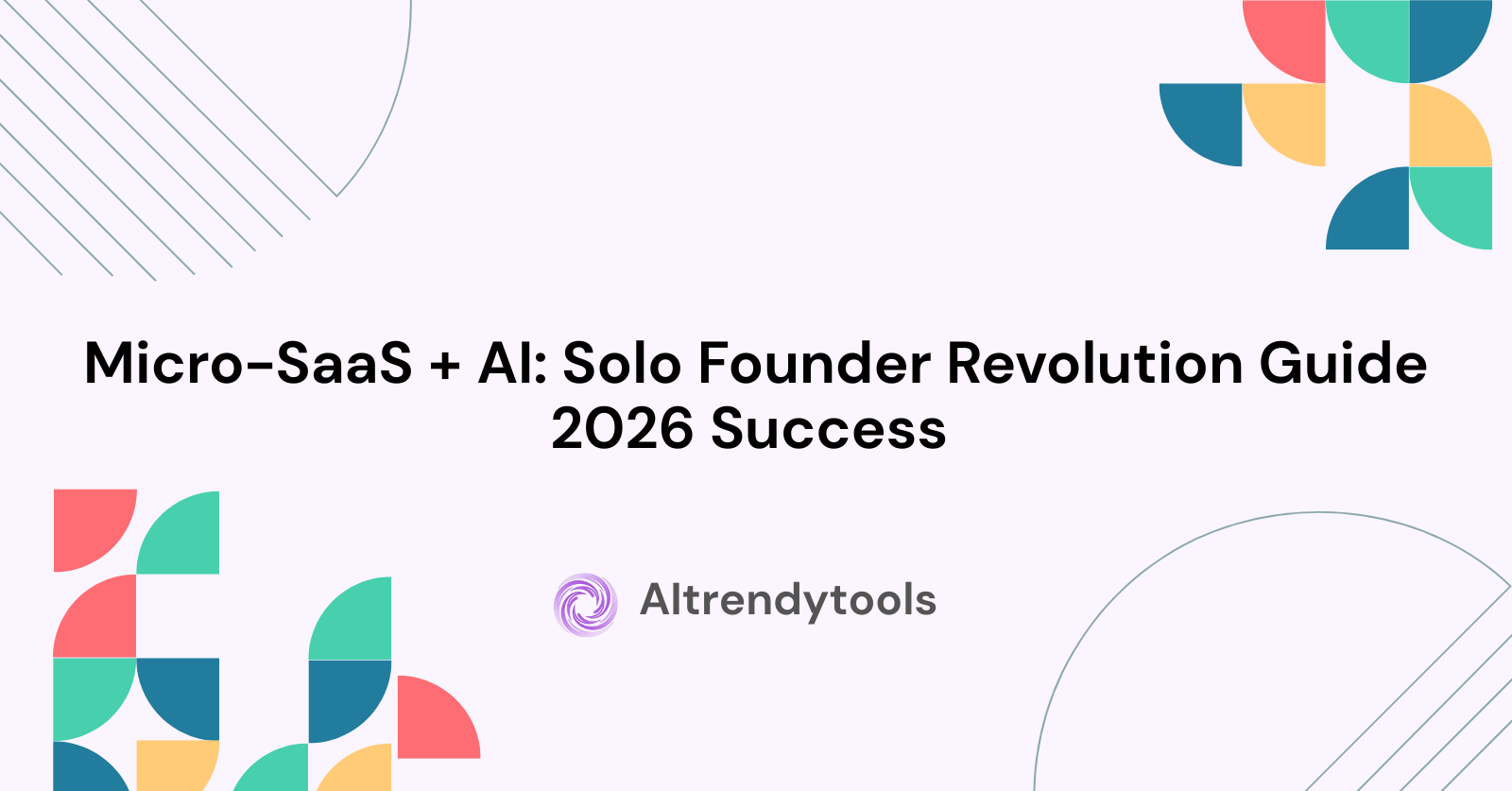🔥 AITrendytools: The Fastest-Growing AI Platform |
Write for usMicro-SaaS + AI: Solo Founder Revolution Guide 2026 Success
Discover how AI transforms micro-SaaS for solo founders in 2026. Learn strategies, tools & profitable ideas to build successful one-person businesses.
Sep 25, 2025
Introduction to the Micro-SaaS AI Revolution
The year 2026 marks a transformative period for solo entrepreneurs who combine micro-SaaS with artificial intelligence technologies. This powerful combination creates unprecedented opportunities for individual founders to build profitable, scalable businesses without traditional team requirements or massive capital investments.
Solo founders now leverage AI automation to handle customer support, content creation, data analysis, and product development tasks that previously required entire teams. The barriers to entry for SaaS businesses have dropped dramatically as AI tools become more sophisticated and accessible to individual entrepreneurs.
The micro-SaaS model focuses on solving specific problems for niche markets rather than competing with enterprise-level solutions. This approach allows solo founders to create sustainable businesses with recurring revenue streams while maintaining complete control over their operations and strategic decisions.
Artificial intelligence amplifies the capabilities of individual entrepreneurs by automating repetitive tasks, providing data-driven insights, and enabling rapid product iteration. Solo founders can now compete effectively with larger organizations by leveraging AI tools that level the playing field in terms of operational efficiency and market responsiveness.
What is Micro-SaaS for Solo Founders
Micro-SaaS represents small-scale software-as-a-service businesses designed to serve specific niches or solve particular problems for targeted customer segments. Solo founders typically generate between $1,000 to $50,000 in monthly recurring revenue while operating independently without employees or co-founders.
These businesses focus on simplicity, automation, and customer-centric solutions that address real pain points in specialized markets. Solo founders prioritize profitability over growth velocity, creating sustainable businesses that provide lifestyle flexibility and financial independence.
Key Characteristics of Micro-SaaS:
- Single founder or very small team
- Focused on specific niche markets
- Monthly recurring revenue model
- Minimal operational complexity
- High profit margins
- Automated business processes
The micro-SaaS approach contrasts with traditional SaaS startups that pursue rapid scaling, venture capital funding, and large market opportunities. Solo founders choose sustainable growth over exponential expansion, prioritizing profitability and personal control over business valuation and exit strategies.
Modern micro-SaaS businesses leverage cloud infrastructure, no-code platforms, and AI automation to minimize technical complexity and operational overhead. This technological foundation enables solo founders to launch products quickly while maintaining high-quality user experiences.
AI-Powered Micro-SaaS Business Models
Artificial intelligence enables solo founders to create sophisticated micro-SaaS products that deliver exceptional value while requiring minimal ongoing maintenance. AI-powered business models focus on automation, data processing, and intelligent recommendations that solve customer problems efficiently.
Content generation represents a popular AI-powered micro-SaaS category where solo founders create tools for automated writing, social media content, email sequences, and marketing copy. These solutions leverage natural language processing to produce human-quality content at scale.
Popular AI Micro-SaaS Categories:
- Automated content creation tools
- Data analysis and reporting platforms
- Customer support chatbots
- Marketing automation systems
- Image and video processing services
- Personalized recommendation engines
Predictive analytics micro-SaaS solutions help businesses make data-driven decisions by analyzing customer behavior, market trends, and operational metrics. Solo founders package these capabilities into user-friendly interfaces that non-technical customers can operate independently.
Automation-focused micro-SaaS products connect different software systems and automate routine business processes. These solutions save customers significant time while generating steady recurring revenue for solo founders who build once and scale infinitely.
The subscription model works particularly well for AI-powered services because customers experience ongoing value through continuous algorithm improvements and updated datasets. Solo founders benefit from predictable revenue while delivering increasing value over time.
Solo Founder Success Strategies
Successful solo founders develop systematic approaches to product development, customer acquisition, and business operations that maximize their individual capabilities while minimizing time investment in non-essential activities.
Market validation represents the foundation of solo founder success. Smart entrepreneurs identify specific customer pain points and validate demand before building products. This approach prevents wasted development effort on solutions that lack market demand or willingness to pay.
Essential Success Strategies:
- Focus on one specific customer segment initially
- Validate demand before building features
- Automate everything possible from day one
- Prioritize recurring revenue over one-time payments
- Build minimal viable products quickly
- Gather customer feedback continuously
Customer development requires direct communication with target users to understand their challenges, workflow requirements, and budget constraints. Solo founders who invest time in customer research create products that solve real problems and command premium pricing.
Pricing strategy significantly impacts micro-SaaS profitability. Solo founders should price based on customer value delivery rather than competitor analysis or cost-plus models. Higher prices attract more serious customers while reducing support overhead and churn rates.
Platform risk management involves diversifying customer acquisition channels and avoiding over-dependence on single platforms or traffic sources. Successful solo founders build direct customer relationships through email lists, content marketing, and word-of-mouth referrals.
Best Micro-SaaS Ideas for 2026
Emerging opportunities in 2026 center around AI integration, remote work solutions, and specialized tools for growing industries like creator economy, sustainability, and digital health. Solo founders should identify trends early and build solutions before markets become saturated.
Remote work productivity tools continue growing as distributed teams require better collaboration, project management, and communication solutions. Micro-SaaS products that solve specific remote work challenges can capture recurring revenue from businesses and individual professionals.
High-Potential Micro-SaaS Ideas:
- AI-powered social media schedulers
- Automated invoice and payment processing
- Customer feedback analysis platforms
- Website accessibility compliance tools
- Local business reputation management
- Personal finance automation for freelancers
Creator economy tools help content creators, influencers, and online entrepreneurs manage their businesses more effectively. These solutions include audience analytics, content planning, sponsorship tracking, and revenue optimization features tailored for individual creators.
Compliance and security micro-SaaS products serve businesses that need specialized solutions for industry regulations, data protection, and risk management. These niche markets often pay premium prices for software that reduces legal and operational risks.
Environmental sustainability software helps businesses track carbon footprints, manage waste reduction programs, and comply with environmental regulations. Growing corporate focus on sustainability creates opportunities for specialized micro-SaaS solutions.
Healthcare and wellness micro-SaaS products serve practitioners, clinics, and wellness businesses with specialized tools for patient management, appointment scheduling, and treatment tracking. Regulatory requirements create barriers that protect established micro-SaaS providers.
Profitable Micro-SaaS Development Process
Solo founders need streamlined development processes that balance speed, quality, and resource efficiency. Modern development approaches leverage no-code platforms, AI assistance, and agile methodologies optimized for individual entrepreneurs.
Market research and validation should consume 20-30% of total project time before writing any code. This upfront investment prevents building products that lack market demand or fail to solve meaningful customer problems.
Development Process Steps:
- Conduct market research and competitor analysis
- Interview potential customers about pain points
- Create minimal viable product wireframes
- Build basic functionality using no-code tools
- Test with beta customers and gather feedback
- Iterate based on user behavior and requests
No-code and low-code platforms enable solo founders to build sophisticated applications without extensive programming knowledge. These tools reduce development time and allow focus on customer validation and business development rather than technical implementation.
Beta testing with real customers provides invaluable feedback about feature priorities, user experience improvements, and pricing sensitivity. Solo founders should recruit beta users from their target market rather than friends and family who may provide biased feedback.
Iterative development involves releasing minimal features quickly and improving based on customer usage patterns and feedback. This approach reduces development risk while ensuring product-market fit before investing significant time in advanced features.
Platforms like AiTrendyTools provide valuable insights into emerging AI technologies and market trends that solo founders can leverage for competitive advantages and product differentiation strategies.
AI Tools for Solo Entrepreneurs
Artificial intelligence tools dramatically expand the capabilities of individual entrepreneurs by automating complex tasks, providing analytical insights, and enabling rapid content creation. Solo founders who master AI tools gain significant competitive advantages over traditional businesses.
Customer service automation through AI chatbots handles routine inquiries, processes refunds, and provides product support without human intervention. These systems improve customer satisfaction while reducing operational overhead for solo founders.
Essential AI Tools Categories:
- Content creation and writing assistants
- Customer support chatbots and automation
- Data analysis and business intelligence
- Social media management and scheduling
- Email marketing and lead nurturing
- Financial planning and bookkeeping
Marketing automation AI tools create personalized customer journeys, segment audiences based on behavior patterns, and optimize advertising campaigns for maximum return on investment. These capabilities enable solo founders to compete with larger marketing teams.
Financial management AI helps solo founders track expenses, forecast revenue, and optimize pricing strategies. Automated bookkeeping and tax preparation reduce administrative burden while ensuring accurate financial records.
Content creation AI assists with blog writing, social media posts, email newsletters, and marketing copy. Solo founders can maintain consistent content marketing efforts without dedicating excessive time to writing and editing tasks.
Design and development AI tools help create professional websites, mobile applications, and marketing materials without specialized design skills. These solutions enable solo founders to maintain professional brand presentation across all customer touchpoints.
Building Successful One-Person Businesses
One-person businesses require different strategies and mindsets compared to traditional startups that plan for team growth and external funding. Solo founders prioritize automation, systems thinking, and sustainable growth over rapid scaling and market dominance.
Operational efficiency becomes critical when managing all business functions individually. Successful solo founders develop systems and processes that minimize time investment while maintaining high-quality customer experiences and business operations.
One-Person Business Fundamentals:
- Automate repetitive tasks and workflows
- Focus on high-value activities only
- Maintain simple business models
- Prioritize customer retention over acquisition
- Build scalable systems from the beginning
- Outsource only when necessary
Time management requires ruthless prioritization of activities that directly impact revenue and customer satisfaction. Solo founders should eliminate or automate tasks that don't contribute measurably to business growth or customer value.
Customer relationship management becomes more important for solo founders because losing customers has proportionally higher impact on smaller businesses. Investing in customer success and retention generates higher lifetime value and reduces acquisition costs.
Financial management for one-person businesses involves maintaining healthy cash flow, building emergency reserves, and avoiding unnecessary expenses that don't directly contribute to business growth or customer satisfaction.
Personal sustainability prevents burnout and ensures long-term business success. Solo founders need boundaries between work and personal time, regular breaks, and systems that function without constant attention.
Micro-SaaS Marketing Automation
Marketing automation enables solo founders to nurture leads, onboard customers, and maintain ongoing engagement without manual intervention. These systems work continuously to drive business growth while founders focus on product development and strategic planning.
Email marketing automation creates personalized customer journeys based on user behavior, subscription status, and engagement levels. Automated sequences handle customer onboarding, feature announcements, and retention campaigns without ongoing management.
Marketing Automation Components:
- Lead capture and qualification systems
- Email nurturing sequences and campaigns
- Social media posting and engagement
- Customer onboarding and education
- Churn prevention and win-back campaigns
- Referral programs and loyalty systems
Content marketing automation schedules blog posts, social media updates, and newsletter content across multiple platforms. Solo founders can maintain consistent marketing presence without daily content management tasks.
Customer segmentation automation groups users based on behavior patterns, subscription levels, and engagement metrics. This segmentation enables targeted messaging and personalized product recommendations that improve conversion rates and customer lifetime value.
Analytics automation provides regular reports about marketing performance, customer acquisition costs, and lifetime value metrics. These insights help solo founders make data-driven decisions about marketing investments and strategy adjustments.
Referral marketing automation encourages satisfied customers to recommend products to their networks. Automated referral systems reward both referrers and new customers while expanding customer base through word-of-mouth marketing.
Solo Founder Revenue Optimization
Revenue optimization for solo founders involves maximizing customer lifetime value, improving pricing strategies, and developing additional revenue streams from existing customer bases. These strategies increase profitability without proportional increases in operational complexity.
Pricing strategy optimization requires regular analysis of customer willingness to pay, competitor pricing, and value delivery metrics. Solo founders should test price increases gradually while monitoring customer retention and acquisition rates.
Revenue Optimization Strategies:
- Implement value-based pricing models
- Create multiple pricing tiers and features
- Develop upselling and cross-selling systems
- Add professional services or consulting
- Build marketplace or platform features
- License technology to other businesses
Customer lifetime value maximization involves reducing churn rates, increasing usage levels, and expanding customer accounts over time. Successful solo founders invest heavily in customer success and product improvement based on user feedback.
Additional revenue streams can include consulting services, training programs, affiliate marketing, and premium support options. These services leverage existing expertise and customer relationships without significant additional infrastructure requirements.
Subscription model optimization involves finding the right balance between monthly and annual plans, free trials, and freemium options. The optimal model depends on customer preferences, competitive landscape, and cash flow requirements.
Partnership revenue opportunities include affiliate programs, integration partnerships, and white-label licensing deals. These arrangements can generate additional income while expanding market reach and customer acquisition channels.
Scaling Micro-SaaS Without Team Growth
Solo founders can scale their businesses significantly without hiring employees by investing in automation, systems optimization, and strategic partnerships. This approach maintains the simplicity and profitability advantages of one-person operations while achieving substantial revenue growth.
Process automation eliminates manual work and reduces the time required for customer support, billing, onboarding, and routine business operations. Automated systems enable business growth without proportional increases in founder time investment.
Scaling Strategies for Solo Founders:
- Implement comprehensive business automation
- Develop self-service customer features
- Create partner and affiliate programs
- Build API integrations and marketplace presence
- Focus on higher-value customer segments
- Optimize conversion funnels and user experience
Technology leverage involves using advanced tools and platforms to handle complex business functions that traditionally required dedicated staff. Cloud services, AI tools, and integrated software solutions enable sophisticated operations without team growth.
Customer self-service features reduce support demands while improving user experience. Knowledge bases, video tutorials, automated onboarding, and in-app guidance help customers succeed independently while reducing founder time investment.
Strategic partnerships with complementary businesses create distribution channels, integration opportunities, and customer acquisition sources. These relationships enable market expansion without direct sales efforts or marketing investments.
Premium positioning allows solo founders to serve fewer customers at higher price points, increasing revenue while reducing operational complexity. High-value customers typically require less support and generate more stable recurring revenue.
Market expansion into related niches or geographic regions can multiply business size without fundamental changes to products or operations. Successful micro-SaaS solutions often work across multiple adjacent markets with minimal modification.
Future of AI-Powered Solo Entrepreneurship
The trajectory of AI development suggests that solo entrepreneurs will gain access to increasingly sophisticated automation and intelligence capabilities. These advances will enable individual founders to build businesses that compete directly with large organizations across many industries.
Artificial general intelligence development will eventually provide solo founders with AI assistants capable of handling complex strategic decisions, customer relationship management, and product development tasks. This evolution will fundamentally change the scale of businesses that individuals can operate independently.
Future Technological Developments:
- Advanced AI business assistants and advisors
- Fully automated customer acquisition systems
- Predictive analytics for business optimization
- Voice and video AI for customer interactions
- Automated legal and compliance management
- Real-time market analysis and opportunity detection
No-code and low-code platforms will become more sophisticated, enabling solo founders to build enterprise-grade applications without programming expertise. These tools will democratize software development and reduce barriers to creating complex business solutions.
Virtual reality and augmented reality technologies will create new categories of micro-SaaS opportunities while providing immersive tools for business operations, customer service, and product demonstration. These technologies will expand the scope of what solo founders can accomplish.
Blockchain and decentralized technologies may enable new business models for solo entrepreneurs including tokenized services, decentralized autonomous organizations, and peer-to-peer marketplaces that operate without central authorities.
The creator economy and personal branding trends suggest that solo entrepreneurship will become more mainstream and socially accepted. Educational resources, community support, and infrastructure services will continue improving to support individual business builders.
Common Micro-SaaS Mistakes to Avoid
Solo founders often make predictable mistakes that can be prevented through awareness and systematic approaches to business building. Learning from others' experiences helps avoid costly errors and accelerates path to profitability.
Over-engineering represents a common trap where founders build complex solutions before validating market demand. Simple, focused products that solve specific problems perform better than feature-rich applications that try to serve multiple use cases.
Critical Mistakes to Avoid:
- Building features without customer validation
- Pricing too low to attract serious customers
- Neglecting customer support and success
- Over-dependence on single traffic sources
- Ignoring competitive threats and market changes
- Failing to automate repetitive business processes
Pricing mistakes include undervaluing solutions, competing on price rather than value, and failing to test price sensitivity. Solo founders should price based on customer value delivery rather than cost-plus models or competitor matching.
Customer acquisition mistakes involve focusing exclusively on paid advertising, neglecting content marketing, and failing to build direct customer relationships. Diversified acquisition strategies reduce platform risk and improve long-term sustainability.
Product development mistakes include adding too many features, ignoring user experience design, and failing to optimize for mobile devices. Focus on core functionality that solves primary customer problems before expanding feature sets.
Business operations mistakes involve neglecting financial planning, failing to build emergency reserves, and avoiding legal and tax compliance requirements. Proper business foundation prevents future problems and enables sustainable growth.
Resources like AiTrendyTools can help solo founders stay informed about emerging technologies, market trends, and best practices that prevent common entrepreneurship mistakes while identifying new opportunities.
Conclusion and Next Steps
The convergence of micro-SaaS and artificial intelligence creates unprecedented opportunities for solo founders to build profitable, scalable businesses in 2026. Success requires combining market validation, customer focus, and automation strategies that leverage individual strengths while minimizing operational complexity.
Solo founders who master AI tools, develop systematic approaches to business building, and maintain customer-centric focus can create sustainable competitive advantages over traditional businesses. The key lies in balancing ambition with practical execution while building systems that support long-term growth.
The future favors entrepreneurs who embrace technology, prioritize customer value, and maintain flexibility in rapidly changing markets. Solo founders who start building AI-powered micro-SaaS businesses now position themselves advantageously for the continued evolution of entrepreneurship and technology.
Success in this space requires continuous learning, customer feedback integration, and adaptation to emerging opportunities. The combination of AI capabilities and micro-SaaS business models represents a powerful foundation for individual entrepreneurship that will only become more accessible and profitable over time.
🚀 Submit Your Tool to Our Comprehensive AI Tools Directory
Get your AI tool featured on our complete directory at AITrendytools and reach thousands of potential users. Select the plan that best fits your needs.





Join 30,000+ Co-Founders
Related Blogs
Maharashtra Times: Maharashtra's #1 Marathi Newspaper
Maharashtra Times (मटा) is Maharashtra's #1 Marathi newspaper since 1962. Read today's ePaper, download the free app & get live news from Mumbai, Pune & beyond.
MovieSwap: The Bold Idea to Free Every Movie Ever Made
MovieSwap wanted to let you stream any movie ever made legally. Discover why this bold Kickstarter idea failed and what it means for film fans today.
RapiCredit Review 2026: Fast Loans in Colombia?
Get cash fast with RapiCredit Colombia's top fintech lender. See real rates, requirements & honest reviews before you apply. Is it right for you in 2026?
Submit Your Tool to Our Comprehensive AI Tools Directory
List your AI tool on AItrendytools and reach a growing audience of AI users and founders. Boost visibility and showcase your innovation in a curated directory of 30,000+ AI apps.





Join 30,000+ Co-Founders

